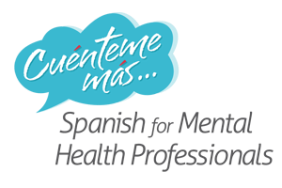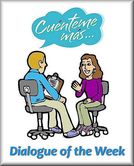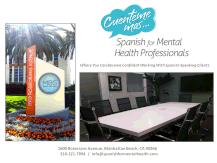CE DRAFT - Holding Product - Video Package: Assessment Bundle
SKU:
$0.00
Unavailable
per item
For Psychotherapists, Social Workers, Psychologists and Psychiatrists who are working on improving their assessment skills in Spanish, we have bundled this special package. You receive the following videos plus their accompanying worksheets.
Assessment Topic: Video #1 Presenting Problem
Time: 12:22
Practice working with your client around the Presenting Problem. Learn useful vocabulary, questions, phrases and reflecting statements while using the Usted form correctly and displaying appropriate cultural knowledge and vocabulary. This module covers identifying Presenting Problems in a Parent Interview.
Assessment Topic: Video #2 Predisposing Factors
Time: 13:32
Eavesdrop on an Assessment session between psychologist Dr. Mena and the mother of his teenage client Susana. This module helps Dr. Mena identify Predisposing Factors of the Presenting Problem. Within this section flow the Cultural Constructs Familismo y Confianza.
Understand and practice operationalizing Familismo in session. Practice using the plural Ustedes form, since in this module Dr. Mena is talking to more than one person. Practice questions, statements, and vocabulary to interview your client about Predisposing Factors to the Presenting Problem.
Assessment Topic: Video #3 History of the Problem in a Parent Interview
Time: 6:22
In this video you will begin treatment of a teenager by working with the parent as part of a Psycho-Social Assessment. You will listen to the parent talk about the problems he is experiencing with his teenage son.
You will learn key therapist phrases to use in performing a thorough assessment with the parent of a teenage client. You will work with direct and indirect objects and pronouns and reflexive constructions; past and present tenses.
Assessment Topic: Video #4 Immigration Issues
Time: 32:00
Please note this video does not provide legal advice to clinicians or clients. If you need to suggest to your client that he or she consult with an attorney, you can use: "Le recomiendo que consulte con un (su) abogado." (I recommend that you consult with an (your) attorney.)
This video covers psycho-social impact of migration on the family. Join us as Doctor Carla receives her client, Mr. Fernandez, and handles the situation when he unexpectedly brings family members to the session! Explore Mr. Fernandez' presenting problems; Therapist-Client dialogue; cultural construct Familismo; assessment of psycho-social factors.
Practice a thorough psycho-social evaluation using phrases and questions for disappeared persons; expressions of time; therapist reflecting statements; threats and exile; family member separation reflecting statements; Latin American nationalities and countries; explore losses; trauma during migration; problems with immigration status; repeat and clarify; close the session.
Assessment Topic: Video #5 Evaluation of Medication & Substances
Time: 38:30
Practice therapist and client dialogue in a Substance Use Assessment.
Therapist questions and statements to determine patterns of substance use/abuse in the client
- Language to determine frequency, duration and severity of use
- Determine negative consequences of use
- Learn about prior psychiatric treatment / Substance use history
- Determine family patterns of use
- Obtain client's consent to consult with another provider
Prepare for common client responses
- Extensive clinical and drug vocabulary
- Selections of types of client responses
Simple advice (consejos) until the next session
- Provide appropriate referrals
- Confirm the next appointment
Assessment Topic: Video #6 Initial Assessment of Abuse: Physical, Sexual and Parts of the Body
Time 23:04
This video helps Mental Health Professionals improve confidence with an Initial Assessment and Counseling Session that may involve physical and/or sexual abuse issues.
This module covers:
° Verbs and Verb Conjugations having to do with Physical and/or Sexual Abuse such as hit, kick, bite, touch, shoot, rape, choke, stab. (Verbal, Emotional and Neglect are covered in a separate module.)
° Words and sentences that focus on Parts of the Body. Sentences combine Verbs like Tocar (to touch), Manosear (to rub) and Nouns for parts of the body, for example mis partes privadas (private parts), mi pierna (my leg).
Additionally we practice Therapist Statements:
° To elicit information: For example "Can you tell me about what happened? What type of things occurred? I hope you will feel comfortable telling me the whole story."
° If it's reportable: Be prepared if you discover that something reportable has occurred with appropriate statements.
° To provide the intervention of Reflecting Feeling: practice emotional words vocabulary and form into reflecting statements to provide relief to the client.
° Counsel with normalizing statements such as "Unfortunately physical and sexual abuse is common," "This is not your fault." Practice several basic statements to help client process abuse experiences.
Assessment Topic: Video #7 Filling Out Paperwork: Personal Information
Time 20:09
In this module you will learn the vocabulary necessary for obtaining information commonly found on an Intake Form. You will also practice building questions to enable you to gather additional information needed.
Assessment Topic: Video #1 Presenting Problem
Time: 12:22
Practice working with your client around the Presenting Problem. Learn useful vocabulary, questions, phrases and reflecting statements while using the Usted form correctly and displaying appropriate cultural knowledge and vocabulary. This module covers identifying Presenting Problems in a Parent Interview.
Assessment Topic: Video #2 Predisposing Factors
Time: 13:32
Eavesdrop on an Assessment session between psychologist Dr. Mena and the mother of his teenage client Susana. This module helps Dr. Mena identify Predisposing Factors of the Presenting Problem. Within this section flow the Cultural Constructs Familismo y Confianza.
Understand and practice operationalizing Familismo in session. Practice using the plural Ustedes form, since in this module Dr. Mena is talking to more than one person. Practice questions, statements, and vocabulary to interview your client about Predisposing Factors to the Presenting Problem.
Assessment Topic: Video #3 History of the Problem in a Parent Interview
Time: 6:22
In this video you will begin treatment of a teenager by working with the parent as part of a Psycho-Social Assessment. You will listen to the parent talk about the problems he is experiencing with his teenage son.
You will learn key therapist phrases to use in performing a thorough assessment with the parent of a teenage client. You will work with direct and indirect objects and pronouns and reflexive constructions; past and present tenses.
Assessment Topic: Video #4 Immigration Issues
Time: 32:00
Please note this video does not provide legal advice to clinicians or clients. If you need to suggest to your client that he or she consult with an attorney, you can use: "Le recomiendo que consulte con un (su) abogado." (I recommend that you consult with an (your) attorney.)
This video covers psycho-social impact of migration on the family. Join us as Doctor Carla receives her client, Mr. Fernandez, and handles the situation when he unexpectedly brings family members to the session! Explore Mr. Fernandez' presenting problems; Therapist-Client dialogue; cultural construct Familismo; assessment of psycho-social factors.
Practice a thorough psycho-social evaluation using phrases and questions for disappeared persons; expressions of time; therapist reflecting statements; threats and exile; family member separation reflecting statements; Latin American nationalities and countries; explore losses; trauma during migration; problems with immigration status; repeat and clarify; close the session.
Assessment Topic: Video #5 Evaluation of Medication & Substances
Time: 38:30
Practice therapist and client dialogue in a Substance Use Assessment.
Therapist questions and statements to determine patterns of substance use/abuse in the client
- Language to determine frequency, duration and severity of use
- Determine negative consequences of use
- Learn about prior psychiatric treatment / Substance use history
- Determine family patterns of use
- Obtain client's consent to consult with another provider
Prepare for common client responses
- Extensive clinical and drug vocabulary
- Selections of types of client responses
Simple advice (consejos) until the next session
- Provide appropriate referrals
- Confirm the next appointment
Assessment Topic: Video #6 Initial Assessment of Abuse: Physical, Sexual and Parts of the Body
Time 23:04
This video helps Mental Health Professionals improve confidence with an Initial Assessment and Counseling Session that may involve physical and/or sexual abuse issues.
This module covers:
° Verbs and Verb Conjugations having to do with Physical and/or Sexual Abuse such as hit, kick, bite, touch, shoot, rape, choke, stab. (Verbal, Emotional and Neglect are covered in a separate module.)
° Words and sentences that focus on Parts of the Body. Sentences combine Verbs like Tocar (to touch), Manosear (to rub) and Nouns for parts of the body, for example mis partes privadas (private parts), mi pierna (my leg).
Additionally we practice Therapist Statements:
° To elicit information: For example "Can you tell me about what happened? What type of things occurred? I hope you will feel comfortable telling me the whole story."
° If it's reportable: Be prepared if you discover that something reportable has occurred with appropriate statements.
° To provide the intervention of Reflecting Feeling: practice emotional words vocabulary and form into reflecting statements to provide relief to the client.
° Counsel with normalizing statements such as "Unfortunately physical and sexual abuse is common," "This is not your fault." Practice several basic statements to help client process abuse experiences.
Assessment Topic: Video #7 Filling Out Paperwork: Personal Information
Time 20:09
In this module you will learn the vocabulary necessary for obtaining information commonly found on an Intake Form. You will also practice building questions to enable you to gather additional information needed.





